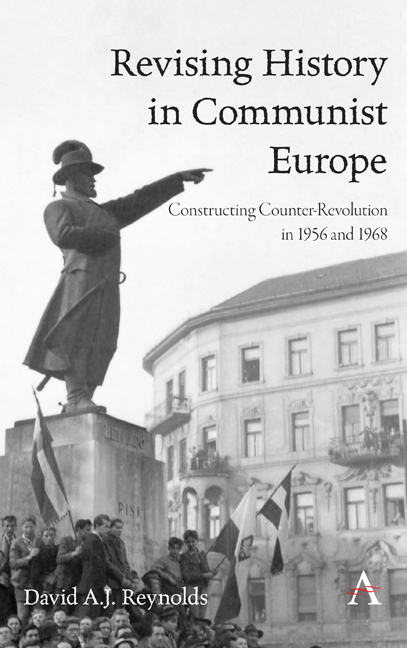Book contents
- Frontmatter
- Dedication
- Epigraph
- Contents
- Acknowledgements
- Introduction
- 1 The Export and Imposition of Stalinism
- 2 Hungarian De-Stalinization and Revising Recent History
- 3 A Revolution, a Counter-Revolution, or a National Uprising?
- 4 Stalinist Purges and De-Stalinization in Czechoslovakia
- 5 The Meaning of 1956 in 1968: March to June
- 6 June: Turning Point and the Hardening of Positions
- 7 July and August: Constructing Counter-Revolution
- 8 The Intentions of Intervention and the Shadow of 1956: Delusion and Failure
- Conclusion
- Epilogue
- Appendix
- Bibliography
- Index
- Frontmatter
- Dedication
- Epigraph
- Contents
- Acknowledgements
- Introduction
- 1 The Export and Imposition of Stalinism
- 2 Hungarian De-Stalinization and Revising Recent History
- 3 A Revolution, a Counter-Revolution, or a National Uprising?
- 4 Stalinist Purges and De-Stalinization in Czechoslovakia
- 5 The Meaning of 1956 in 1968: March to June
- 6 June: Turning Point and the Hardening of Positions
- 7 July and August: Constructing Counter-Revolution
- 8 The Intentions of Intervention and the Shadow of 1956: Delusion and Failure
- Conclusion
- Epilogue
- Appendix
- Bibliography
- Index
Summary
There was no aspect of culture in which a communist regime's monopoly was as important as historical memory. While this grip often meant the erasure of past events and people, it just as significantly entailed the manner in which an event was conceptualized and the loaded terms used to describe it. The way the past was interpreted and recalled was not a peripheral academic issue, but a deeply political matter that cut to the heart of revolutionary states’ legitimacy and authority.
As long as a communist regime controlled the past, its control of the present was secure. ‘To redefine the past is to display mastery in the present,’ EM Simmonds-Duke explains. And as an exercise of power, not research, this redefinition demands only subservience.
The centrality of enforced historical revisionism in communist states was a function both of Communists’ traditional self-understanding and their concept of history itself. Communism necessitates and guides the creation of a new world upon the wreckage of the old. In the event of its revolutionary devotees seizing power, Communism's twin project of construction and destruction makes every contradictory survival of the old and failure of the new threatening.
It was the French Revolution that had, of course, provided a new concept of revolution as a phenomenon which completely upended and replaced what came before. But it did so within an equally novel idea of history as a force which itself propelled people and nations along. To study modern history, for numerous subsequent thinkers of the nineteenth and twentieth centuries, was to study the road on which events were inexorably travelling. For European Communists, as well as many of their contemporaries, history was something whose course had to be plotted in order to identify and join with it. Cause and effect were less important than the necessity of its trajectory.
‘The magic spell which historical necessity has cast over the minds of men since the beginning of the nineteenth century,’ in Hannah Arendt's words, ‘gained in potency by the October Revolution.’ From 1917 through to Communism's European demise seven decades later, therefore, Communists enforced an official view of history – using it to control the past, present, and future – as necessity and inevitability. Rightly understood, communist dogma insisted, history presents us with a path that has necessitated the present and that will inevitably draw us to a particular future.
- Type
- Chapter
- Information
- Revising History in Communist EuropeConstructing Counter-Revolution in 1956 and 1968, pp. 1 - 6Publisher: Anthem PressPrint publication year: 2020



